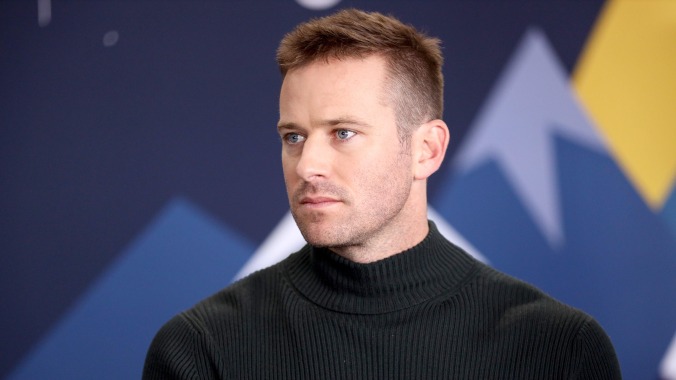Armie Hammer accuser calls out House Of Hammer directors: "They remind me of Armie"
Directors Elli Hakami and Julian P. Hobbs have responded to accusations of exploitative behavior from Hammer accuser "Effie"

Discovery+ released its new three-part docuseries House Of Hammer this week, an attempt to tie the various accusations of sexually abusive and manipulative behavior that have been levied against actor Armie Hammer in recent years into a longer legacy of his extraordinarily rich and powerful family. Now, though, the series has come under criticism from the first woman to make public accusations against Hammer, who has accused directors Elli Hakami and Julian P. Hobbs of exploitative behavior, saying, “They remind me of Armie.”
This is per The L.A. Times, which notes that “Effie,” the woman who first spoke out against Hammer (and who has declined to reveal her last name out of harassment concerns) has issued a statement calling out the directors. “The way they’ve been exploiting my trauma is disgusting. When I keep screaming ‘no’ and they keep going, saying they don’t need my permission, they remind me of Armie.”
Although Effie declined to appear in the docuseries, several of her social media posts detailing abuse and alleged sexual assault by Hammer do appear in the show. Her lawyer, Gloria Allred, also appears in the series, giving an interview.
Hakami and Hobbs responded to Effie’s accusations this weekend, claiming they’re within their rights to use material placed on social media by her:
There’s all types of laws around material and the use of material. And when she posted on a public forum … her allegations against Armie Hammer enter into the public discourse, right? So that’s been covered by numerous outlets. And that [press conference clip] has been covered by numerous outlets. So now you don’t have to get permission.
Hobbs also notes that, because Effie’s accusations were the inspiration for other women—including Courtney Vucekovich, a former partner of Hammer’s whose interviews make up a major portion of the series—to come forward, it was important to include them in their show. “So I think in connecting the timeline of events, she fits more in this timeline of the unfolding scandal—her coming forward was a major moment.” He also highlighted a philosophical difference between the directors and the accuser: “[Effie]‘s been vocal that she thinks that making any form of media out of these events is somewhat problematic. As filmmakers, we don’t take that view. We feel we actually have an obligation to tell the stories.”